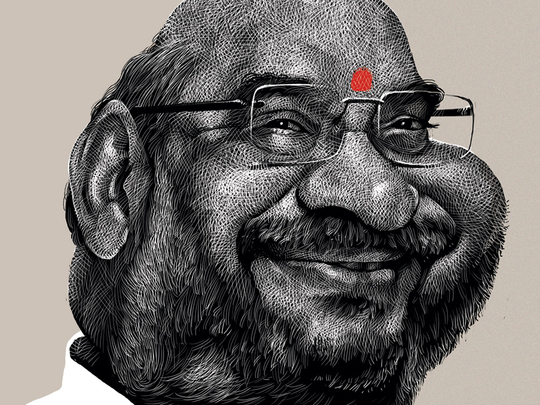
If his undergraduate days as a student of Biochemistry taught him the fine art of permutations and combinations to arrive at a compound whose end value would far exceed the intrinsic value of its constituents, then his days as a stockbroker in various cooperative banks in Ahmedabad must have offered hands-on lessons on the ‘buy-low-sell-high’ mantra. Whichever way you look at it, Bharatiya Janata Party (BJP) president and the mastermind of Narendra Modi’s stunning electoral success in the 2014 general elections, Amit Shah, 50, is that unputdownable character for whom form is substance.
His meteoric rise in national politics, his dalliance with controversies, his stellar role as the brain behind BJP’s recent poll successes, his repeated brush with criminal cases ... anything and everything about the Indian prime minister’s man-for-all-seasons is bound to fascinate even the most apolitical of minds.
Amit Shah: A case study in mindcraft and machinations — those deadpan eyes behind powered glasses almost belying the inner mental core of tempered steel. The body language is remarkably taut — to the extent of being a walking-talking ‘do-not-mess-with-me’ signage!
But ironically, ‘mess’ is the word to describe Shah’s predicament over his alleged involvement in two cases of fake encounters and extrajudicial killings that had happened during his tenure as Gujarat home minister. Shah’s alleged role in the Ishrat Jahan fake encounter case in June 2004 and the extra-judicial killings in the Sohrabuddin Shaikh fake encounter case in 2010 are blots that will be hard to scratch. Added to these was the ‘snoopgate’ controversy, when Shah was alleged to have ordered a round-the-clock surveillance of a young woman in Gujarat in 2009, at the behest of a superior that Shah kept referring to as the “saheb”, or the boss, revealed in telephone transcripts made public by a section of the media.
While ‘snoopgate’ was an embarrassment that Shah could have air-brushed as some sort of an occupational hazard, the Central Bureau of Investigation gave him a clean chit in the Ishrat Jahan case. But it was the Sohrabuddin extra-judicial killings case that delivered a body blow as Shah had to court arrest – barely two weeks after he lost his mother — and spend three months behind bars before being granted bail by the Gujarat High Court. However, even before Shah could take a deep breath, came yet another damaging court order that banished him from his home state of Gujarat for two years.
For many, such a series of setbacks would have drawn the curtains forever. But Shah rose like a phoenix. Buoyed by a Supreme Court order in 2012, he returned home and went on to win the assembly election from Naranpura.
Turning almost every disadvantage into an advantage has always been Shah’s forte. The court order that banished him from setting foot in Gujarat for two years, forced him to seek shelter in the national capital of New Delhi — a city that he was not familiar with at all. He was a reluctant visitor to Delhi, but those days spent at Gujarat Bhavan (Gujarat government guest house) with his wife actually brought him closer to the corridors of power in the capital and helped build a network of friends and like-minded people.
Shah’s close association with Modi dates back to 1982, when Shah was a Rashtriya Swyamsevak Sangh (RSS) volunteer and Modi an RSS pracharak (preacher). Later on, Modi inducted him in his cabinet and soon Shah rose to prominence as the Gujarat chief minister’s most trusted lieutenant. Quite like turning state politics in Gujarat on its head, Shah was the man responsible for scripting BJP’s stunning success in the key battleground state of Uttar Pradesh (UP) in 2014 — winning 73 of the 80 parliamentary seats. Right from choosing the candidates for each constituency to zeroing in on Varanasi as the second seat for Modi outside Gujarat and forcing anti-Modi stalwarts in BJP like Murli Manohar Joshi and L.K. Advani to fall in line ... BJP was playing to Shah’s tune. And the results left everyone spellbound. It is not for nothing that Shah has been dubbed as “India’s second-most powerful man” after the prime minister by a section of the media. Even in the latest state assembly elections in Haryana and Maharashtra, Shah’s go-it-alone has earned rich dividends. While BJP earned a simple majority in Haryana, in Maharashtra, Shah’s recipe of wait-and-watch has virtually had Shiv Sena and the Nationalist Congress Party stepping on each other’s toes in a desperate bid to being heard.
Indian politics has scarcely had a more controversial character than Shah. His success as a master political strategist is undeniable, while his contentious role as a Gujarat strongman continues to earn him negative press. Reconciling all the negative headlines that his past has generated with the present positives of a successful election manager is Shah’s biggest challenge and he will have to walk that tight rope for some time to come.







